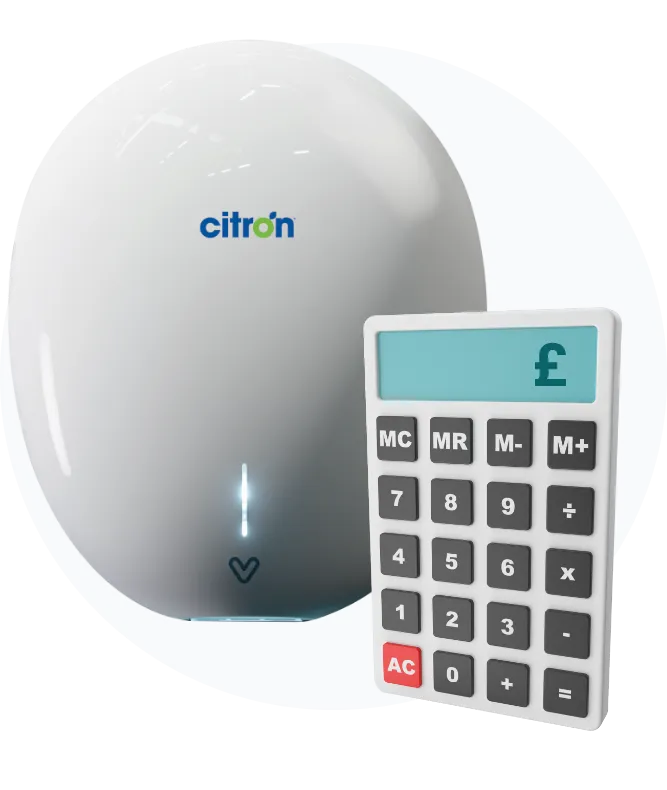Are you a Facility Manager looking at the most effective way to keep your premises safe and hygienic? Let’s talk about HEPA filters and why HEPA filters should be on your agenda when choosing hygiene products for your facility.
Table of Contents
What Does HEPA Stand For?
“HEPA” is a term used to represent “high-efficiency particulate air” which is a type of filter used in air care and hand drying solutions. HEPA filters are the most important part of the filtration process, designed to clean the air and ensure any particles that are harmful to health are filtered out to release clean air from air purifiers and hand dryers. HEPA filters are useful and effective against viruses, bacteria, allergens and are used to improve the quality of life of those who suffer from allergies and asthma.
HEPA filters remove more than 99.9% of the particles from the air stream that passes through them. These particles can be allergens, viruses, bacteria, chemical compounds, dust, and many more. HEPA filters have several use cases and can be found in products such as hand dryers, air purifiers, and vacuum cleaners due to the capability to filter even the tiniest particles from the air.
How Do HEPA Filters Work?
HEPA filters work to capture air particles in a various ways however overall, a HEPA filter aims to absorb air, pass the air through a series of filters in order to release clean air into the room. The filter is composed of a mesh of randomly placed fibres, which are usually layers of cellulose, synthetic fibre, or glass fibres. These fibres are arranged in an accordion shape, which gives them a greater capacity to capture the particles and remove pathogens larger than 0.3 microns. There are four different ways the HEPA filter captures particles including inertial impaction, interception, diffusion, and sieving. Having four ways of filtering allows the HEPA filter to capture different sizes of particles.
Inertia
Inertia work on large, heavy particles suspended in the flow stream. These particles are heavier than the fluid surrounding them. As the fluid changes direction to enter the fibre space, the particle continues in a straight line and collides with the media fibres where it is trapped and held.
Direct Interception
Direct interception works on particles in the mid-range size that are not quite large enough to have inertia and not small enough to diffuse within the flow stream. These mid-sized particles follow the flow stream as it bends through the fibre spaces. Particles are intercepted or captured when they touch a fibre.
Diffusion
Diffusion works on the smallest particles. Small particles are not held in place by the viscous fluid (air) and diffuse within the flow stream. This means that the smaller a particle is, the more likely it is to traverse the flow stream, making it more likely to collide with the fibre and be collected.
Sieving
Sieving, the most common mechanism infiltration, occurs when the particle is too large to fit between the fibre spaces.
Thanks to these four types of filtration, the true HEPA filter can capture 99.9% of airborne particles that are harmful to our health.
Could new hand dryers save your business money?
See how much you could save by switching to Pebble Hand Dryers in your washroom
What are the Benefits of HEPA Filters?
Do Not Emit Harmful By-Products
HEPA filters are designed to work efficiently without generating by-products, unlike other systems that emit hidden harmful by-products while they are environmentally friendly too.
Helps to Create a Family-Friendly Environment
Does your premises attract mothers with young children and new-borns? If so, a HEPA filter system can protect young children and infants from allergies. In fact, a study found that HEPA filtration can actually improve asthma control in children exposed to traffic-related airborne particles. In premises such as schools and nurseries and in the wake of covid-19, with more children spending time indoors with the windows closed, HEPA filters can help to clean the air and keep facilities safe.
Cleaner Air Means Fewer Sick Days
Cleaner air means fewer sick days, having a positive impact on productivity, protecting your valuable resource and your bottom line. Installing hand dryers or air purifiers that contain HEPA filters will show you take hygiene seriously which will boost morale and loyalty to your company.
Use Cases for HEPA Filters
HEPA Filter In Air Purifiers
There are so many choices available on the market when it comes to air care solutions from scented air fresheners to air purification solutions. Many air purifiers now feature HEPA filters in addition to other technologies such as UV bulbs and ozone to freshen and purify the air. HEPA filters provide an additional level of protection.
If you are purchasing any products with a HEPA filter it should have a MERV rating attached to it which describes the filters ability to capture particles ranging from 0.3 to 10 microns. The higher the number, the more effective the unit is at capturing different particles.
HEPA Filters In Hand Dryers
Washroom facilities are one of the most important areas in commercial facilities where touchpoints should be minimised and effective hand washing and drying options can help aid good hygiene habits for a healthy and safe facility. While hand dryers alone are hygienic, looking for hand dryers that have a HEPA filter can give your workforce an added level of confidence that a commercial facility has made the extra effort to ensure clean filtered air.
Things to Be Aware of When Choosing HEPA filtered products
One thing to ensure you’re aware of when looking at products with HEPA filters is the ability to capture microns. In order to be deemed effective, a filter needs to capture particles that are more than 0.3 microns in size. While many products may claim to have HEPA filters, checking this all-important number is key to ensuring that airborne bacteria and other microbes are successfully captured.
HEPA filters must also be certified and must pass certain tests to ensure they are safe and effective for use. In the United Kingdom and Europe, HEPA filters are classified under the UNE-EN 1822-1: 2020 standard. This standard splits out HEPA filters into three categories; EPA, HEPA and ULPA, with all three having different degrees of classification depending on their ability to retain particles. Most HEPA filters have a filter class of either H13 or H14, or True HEPA which indicates that the filter in the product has a 99.97 efficiency rating.
More Guidance on Choosing Air Care or Hand Dryer Solutions
At Citron Hygiene we supply innovative products that feature advanced performing technology. Read our essential guide to choosing the best hand dryers or alternatively, explore our range of air care solutions and commercial hand dryers.

